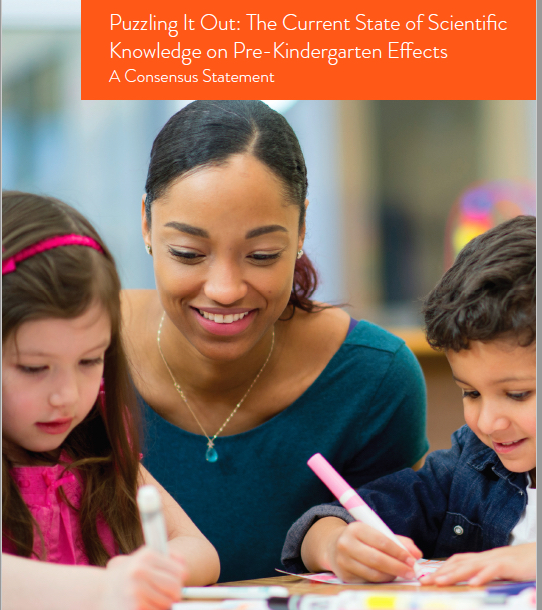Heavyweights weigh in on prekindergarten
- April 20, 2017
- / Shannon Nickinson
- / education

On April 17, the Brookings Institute hosted experts in early childhood education.
You might call it a “come to Jesus meeting” on early education.
On April 19, the Brookings Institute hosted a webcast and panel discussions on preschool and its impact on children. “Puzzling It Out: The current state of scientific knowledge on prekindergarten effect” is linked here.
The experts represented there by an impressive cross-section of heavyweight academic brainpower agree that early education is a critical investment in the future of a child — and the future of a community.
In 2015, 42 states and the District of Columbia spent $6.2 billion in state funds on pre-kindergarten programs. While numerous studies have documented the success of pre-K programs in preparing students for elementary school, some researchers — most notably the authors of a much-discussed analysis of universal pre-K programs in Tennessee — are raising questions about the sustainability of pre-K benefits as children move through their early schooling.
The Brookings panels all agreed Pre-K is a worthwhile investment. And they all agree that more research is needed to figure out how to make the gains that children show early on last.
As Deborah Phillips, psychology professor at Georgetown University, said when she opened the session, quality early education experiences can build not only productive citizens, but also build a workforce that is equipped to meet the demands of the world as it evolves.
“Scientists agree,” Phillips said. “If we want a deeper bench, we need to start earlier.”
The group’s consensus points include:
— Children’s early learning trajectories depend on the quality of their learning experiences not only before and during their pre-K year, but also following the pre-K year.
— There is often greater improvement for economically disadvantaged children and dual-language learners after a year of per-k than there is for more advantaged and English-proficient children.
— Among the factors that may make a difference are curricula that build foundational skills, professional development and coaching for teachers, and organized and engaging classrooms.
— Convincing evidence on the longer-term impacts of contemporary scaled-up pre-K programs on academic outcomes and school progress is sparse, precluding broad conclusions.
“PreK does not happen in a vacuum,” Phillips said.
Or as panelist Brenda P. Jones-Harden, associate professor of human development at University of Maryland said, “You can’t expect a preschool program to be an inoculation against poverty.”
Which underscores the importance of the time a child spends with an adult before preschool in the critical birth to 4 age range. We have to get that right, too.
“There is convincing evidence shows that children attending preK are more ready for school than children who do not. Literacy and numeracy skills show the most improvement," Phillips said.
And that is more than just counting and the alphabet. It’s understanding sorting and grouping, measurement, comparison, problem-solving, telling a story with a beginning, middle and end.
“Learning is cumulative and continuous,” Phillips said. “Once children arrive at the kindergarten door is the new frontier of research.”
That means kindergarten and early elementary grades should be viewed as “charging stations” for sustaining and building on early learning gains, Phillips said.
“The challenge is for kindergarten teachers to make the learning continuous,” Phillips said. “If a child has learned to count and compare from 1-5 before kindergarten, she is ready to do so from 5-10. But if a teacher has to spend more time teaching her classmates to count and compare from 1-5, that child who was ready is a learning dead zone,” where the boost she got in Pre-K might be squandered.
“The hard work of refining these programs so that they can support the intellectual and social skills the nation will need in the future has just begun,” Phillips said.
 CivicCon launches with a look at good growth in cities
CivicCon launches with a look at good growth in cities
 Building stronger brains one baby, one parent at a time
Building stronger brains one baby, one parent at a time
 SCI debuts commercial on Early Learning City
SCI debuts commercial on Early Learning City
 Entrecon: World class speakers and an opportunity to sharpen skills
Entrecon: World class speakers and an opportunity to sharpen skills
 PYP Quality of Life survey 2017
PYP Quality of Life survey 2017
 EntreCon Pensacola 2016: A look back
EntreCon Pensacola 2016: A look back
 Leadership tip: getting better employee takeaways
Leadership tip: getting better employee takeaways
 Leadership tip: be interested instead of interesting
Leadership tip: be interested instead of interesting
 Leadership tip: delivering difficult messages
Leadership tip: delivering difficult messages
 Brain Bags boost Arc, Early Childhood Court programs
Brain Bags boost Arc, Early Childhood Court programs